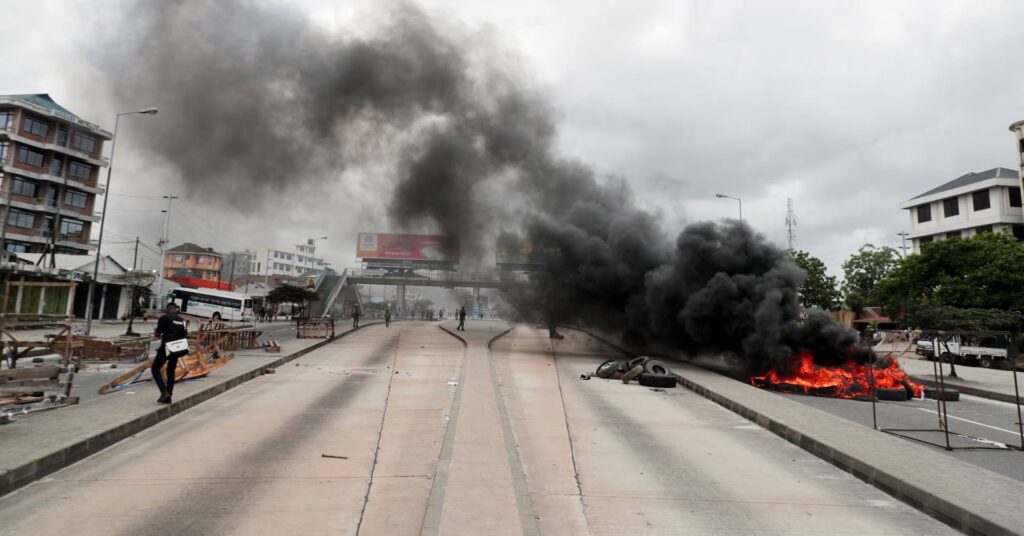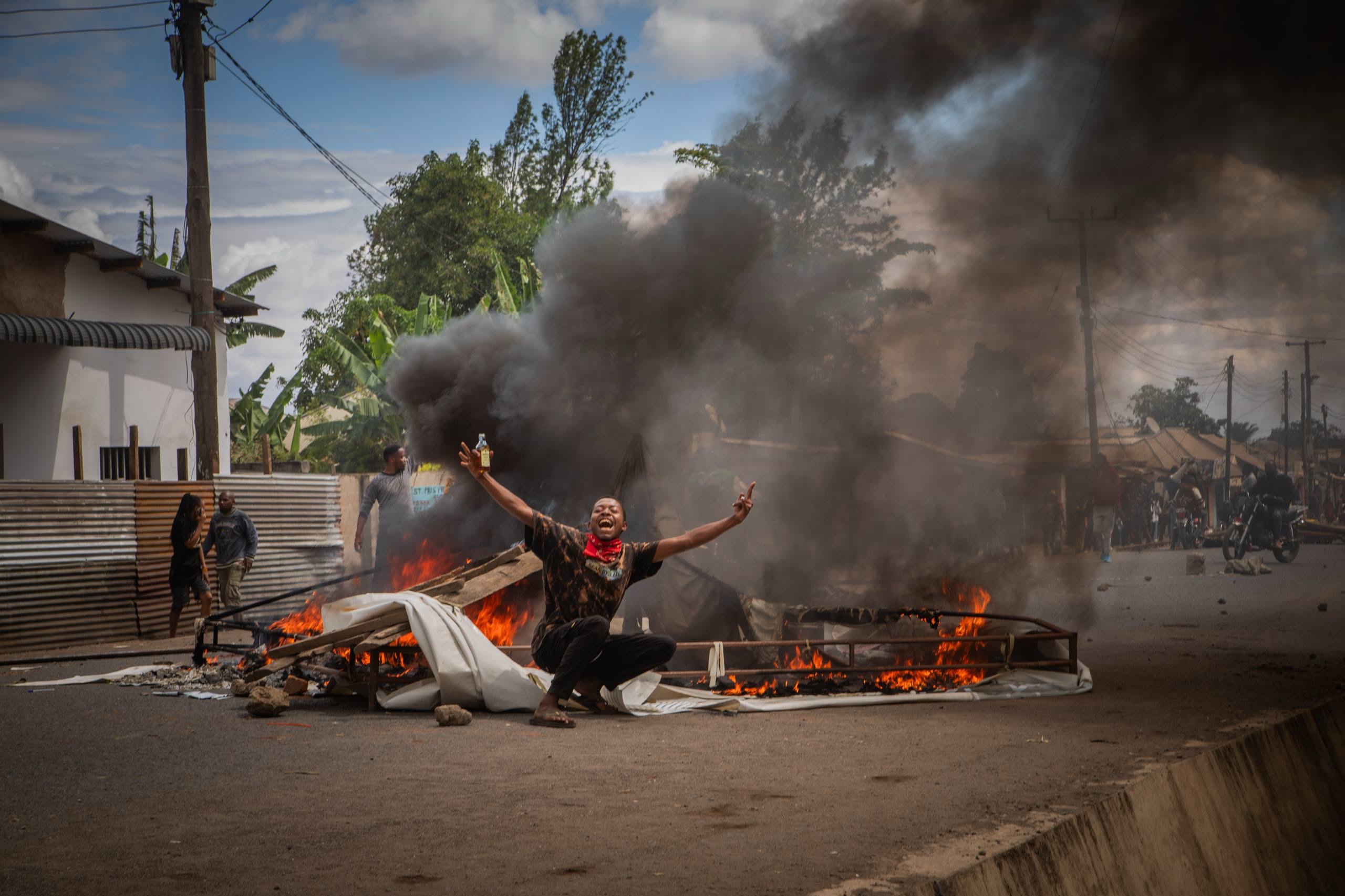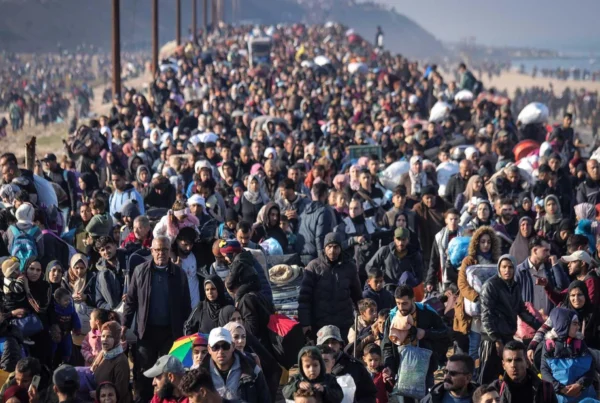Tanzania Protests have erupted across major cities, including Dar es Salaam, as thousands of citizens take to the streets questioning the credibility of recent election results. The demonstrations entered their second consecutive day following allegations of vote manipulation and biased counting.
Amnesty International confirmed at least two fatalities during the clashes between protesters and security forces, further heightening tensions. Opposition groups accuse the ruling party of orchestrating an election process designed to preserve its grip on power, while the government insists the vote was conducted transparently and in accordance with the law.
Growing Unrest Across Major Tanzanian Cities
The protests began shortly after the National Electoral Commission announced preliminary results showing the incumbent’s decisive lead. Within hours, crowds gathered in Dar es Salaam, Arusha, and Dodoma, chanting for justice and demanding an independent audit of the ballots.
Authorities responded with heightened security presence, deploying police and anti-riot units to contain the movement. Witnesses reported tear gas and water cannons being used to disperse crowds. Despite warnings, demonstrators have vowed to continue until the election results are reviewed or annulled.
Allegations of Electoral Fraud and Suppression
Opposition leader Julius Lema declared that the election was “a betrayal of democratic will,” citing widespread reports of ballot tampering and restricted access for election monitors. Several polling stations were allegedly closed early, preventing citizens in opposition strongholds from voting.
Civil society organizations have called for transparency, urging the government to release full vote tallies and allow independent verification. However, the electoral commission maintains that “minor logistical errors” cannot invalidate the overall results.
International observers from the African Union and Commonwealth are monitoring the situation but have yet to issue formal assessments.
Government Denial and Tightened Control
In a televised address, the government described the protests as “unlawful gatherings fueled by misinformation.” Officials warned that “any attempt to destabilize national peace” would be met with firm action.
State broadcasters have limited coverage of the unrest, focusing instead on messages promoting unity and calm. Meanwhile, reports have emerged of intermittent internet restrictions, making it difficult for citizens to share real-time updates.

Human Rights Concerns and Civilian Casualties
Human rights groups warn that the government’s hardline response risks escalating the crisis. Amnesty International and Human Rights Watch have called for restraint, demanding accountability for the reported deaths.
Local hospitals confirmed receiving several injured protesters, though exact figures remain unclear. Activists are urging the international community to intervene diplomatically before the situation deteriorates further.
Calls for International Mediation
The United Nations and regional bodies like the East African Community (EAC) are facing pressure to mediate between the government and opposition. Analysts warn that prolonged unrest in Tanzania could have ripple effects across East Africa, particularly in neighboring Kenya, Uganda, and Rwanda, which share vital trade and energy routes.
Diplomatic sources suggest that preliminary talks may begin within days, but both sides remain deeply entrenched in their positions.
Economic and Regional Implications
The political turmoil in Tanzania has already raised alarms among investors and regional economic planners. Tanzania, known for its stable investment climate and vast natural resources, risks losing international confidence if the crisis intensifies.
Economists caution that continued unrest could disrupt port operations in Dar es Salaam, a key trade gateway for landlocked countries such as Zambia, Malawi, and Burundi. Supply chain disruptions could reverberate across East Africa, affecting fuel distribution, food security, and export logistics.
Potential Impact on East African Stability
Analysts warn that prolonged instability may embolden opposition movements in neighboring states facing similar political challenges. “Tanzania has long been a pillar of stability in the region,” said Dr. Peter Mwangi, a political analyst at the University of Nairobi. “If it falters, the ripple effect on trade and regional diplomacy could be significant.”
Financial markets are also reacting cautiously. The Tanzanian shilling showed minor fluctuations, and regional investors are monitoring whether the unrest will affect tourism and foreign investment commitments.
A Nation at a Crossroads
Tanzania now stands at a critical juncture between preserving democratic integrity and maintaining national order. Civil society leaders emphasize that dialogue remains the only sustainable path forward, urging both sides to prioritize peace over political victory.
Observers note that how the government handles this crisis will shape Tanzania’s democratic trajectory for years to come. Whether through compromise or confrontation, the coming weeks are likely to define the future of governance in one of East Africa’s most influential nations.
The international community continues to watch closely. For deeper regional updates and expert analysis on East Africa’s political landscape, follow related coverage on Olam News.






